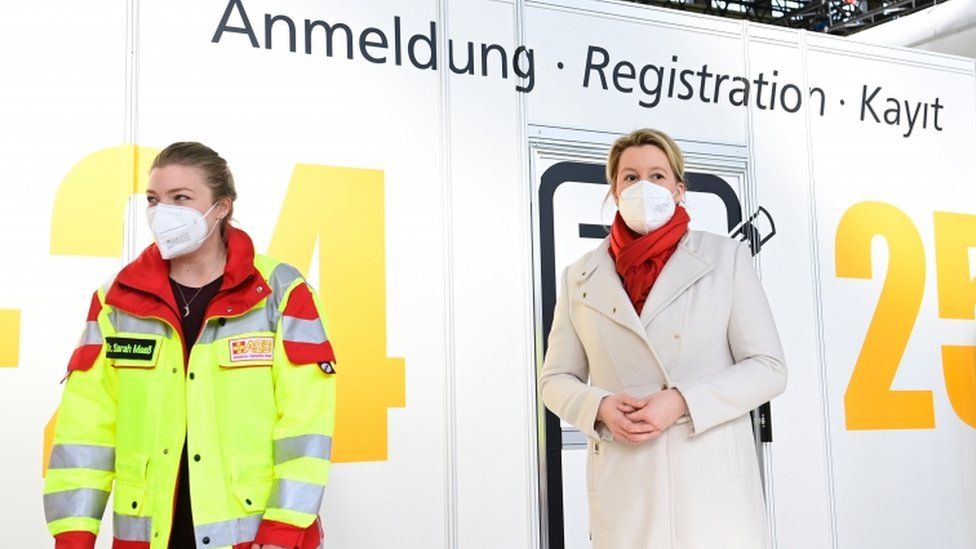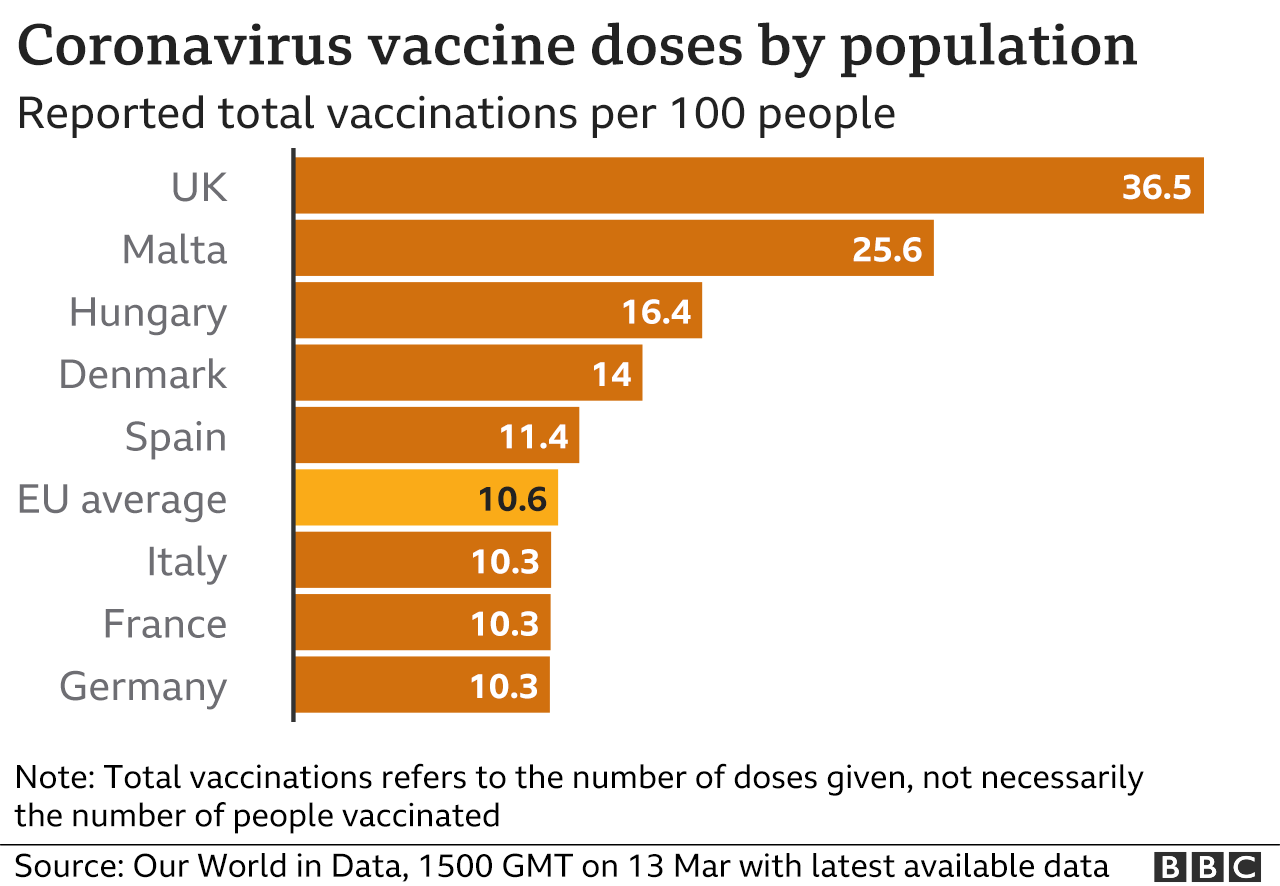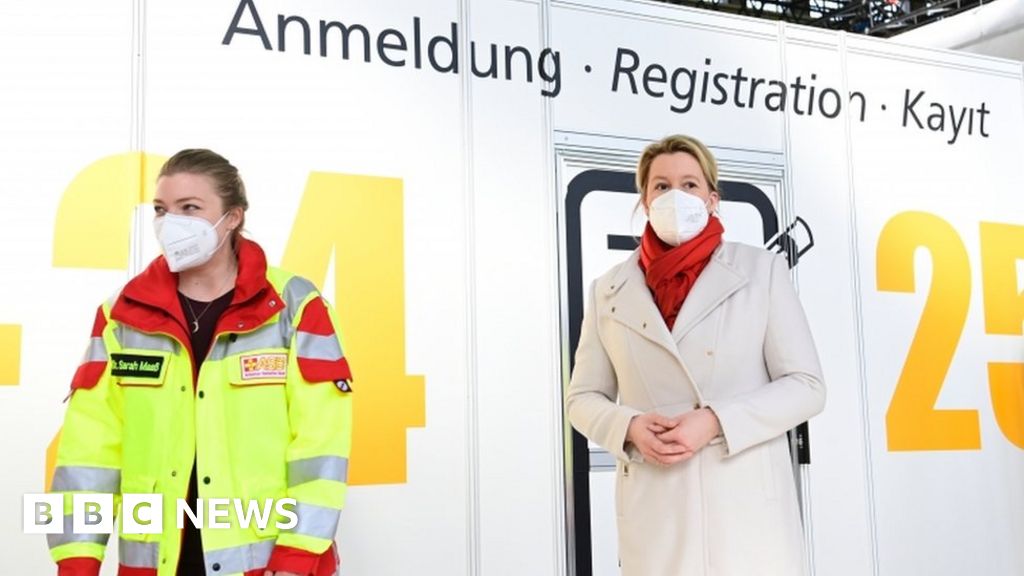
German leaders have postponed a summit on extending the vaccine rollout as they await fuller confirmation that the Oxford-AstraZeneca jab is safe to use.
Germany is among a number of countries that have halted its use over unproven reports that it causes blood clots, but Vice-Chancellor Olaf Scholz said he was hopeful it could be used again.
The EU regulator has again insisted the drug’s benefits outweigh any risks.
The German decision has been criticised by some politicians and doctors.
Emer Cooke, executive director of the European Medicines Agency, said the EMA was still “firmly convinced” of the benefits of the AstraZeneca drug, and she pointed out that blood clots highlighted by some countries were relatively common in the general population. The main question was whether it was a real side-effect of the vaccine or a coincidence, she said.
The benefits continue to outweigh the risks, but this is a
serious concern and it does need serious and detailed scientific
evaluation

The agency’s safety committee will further review the latest evidence and report back on Thursday. Experts from the World Health Organization (WHO) were also meeting on Tuesday but spokesman Christian Lindmeier stressed there was “no evidence” that the incidents were linked to the vaccine.
The WHO has urged countries not to pause their vaccinations.
In the UK, more than 11 million people have already received at least one dose of the AstraZeneca vaccine and there has been no sign of excess deaths or blood clots occurring.
What reaction has there been in Germany?
Germany has so far used 1.6 million doses of the AstraZeneca vaccine, considered second only to the Pfizer-BioNTech drug in importance to the national rollout.
The planned meeting of federal and state leaders will now take place after the EMA decision, and they are expected to back the involvement of a national network of family doctors’ surgeries from April, which officials hope will then enable 20 million vaccinations per month.
German infections are growing “exponentially”, with cases up by 20% in the past week, an expert from the RKI public health agency warned on Tuesday.
There have been seven cases of cerebral blood clots (cerebral sinus venous thrombosis, which is very rare) in recently vaccinated people in Germany, three of them fatal.
The government’s decision to suspend the vaccine on Monday was criticised by Karl Lauterbach, an epidemiologist and health spokesman for the centre-left Social Democrats, who said while it was justifiable, it was also political.
“I would even now get vaccinated with the AstraZeneca. Based on the incidents we now know, the benefits of vaccination significantly outweigh the risks, particularly for the elderly,” he told Deutschlandfunk radio.
A Free Democrat spokeswoman said the decision had set back the entire vaccination rollout. Greens health expert Janosch Dahmen argued that authorities could have provided detailed information about “manageable risk” and continued using the drug.

Why vaccine suspension is a problem for Merkel’s party

Germany’s Health Minister Jens Spahn has insisted this was not a political decision. Indeed, it’s hard to see what the political gain might be – some 200 people are dying every day in Germany.
But the potential political fallout is vast. The government’s scientific advisers recommended that Germany suspend the AstraZeneca vaccine on Monday – just as Chancellor Angela Merkel’s Christian Democrats (CDU) were absorbing humiliating losses in two regional elections over the weekend.
The CDU is losing support as public dissatisfaction grows with her government’s pandemic response and, in particular, that slow vaccine rollout. Some in the party fear the CDU could even be driven out of government at September’s general election.
Mrs Merkel’s health minister was already under fire from opposition parties and from her Social Democrat coalition partners. The AstraZeneca vaccine already has a bit of an image problem in Germany inspired, in part, by the government’s initial decision to give it only to the under-65s. The authorities have argued that taking the cautious approach is about inspiring trust. This decision will most likely have the reverse affect. Diminishing confidence not only in the vaccine, but Germany’s ruling party too.

What is the situation elsewhere?
A series of countries have paused their use of the vaccine. Denmark was first, followed by Norway and Iceland. France, Italy, Cyprus, Sweden, Spain, Latvia and Slovenia are the latest to follow suit.
French vaccination adviser Alain Fischer said there had been a “few very unusual and troubling cases which justify this pause and the analysis”, and he was adamant that the suspension would not affect the campaign. Some reports had indicated that the French decision had come in reaction to the German pause.


The EMA was due to give further details on Tuesday and an update could be forthcoming from the WHO.
Poland is continuing to use the vaccine because it says the benefits outweigh the risks. Some 12% of the population have been vaccinated but infections have risen by 45% in the past week.
Italy initially halted use of a single batch of the AZ vaccine last week and the head of the Aifa medicines authority, Nicola Magrini, said imposing a full suspension was a political decision. The benefit to risk balance, he said, was “widely positive”.
AstraZeneca says a review of 17 million people who received doses in Europe found there were 37 cases of people who had developed blood clots.
Swedish public health officials said the decision to suspend use of the drug was a “precautionary measure”. Latvian authorities said the same, adding they had not had any evidence linking the vaccine to serious health issues.
